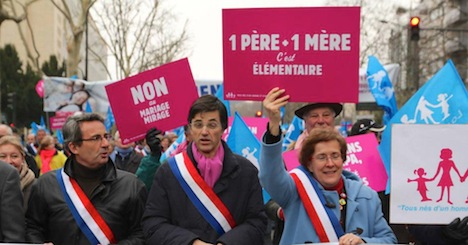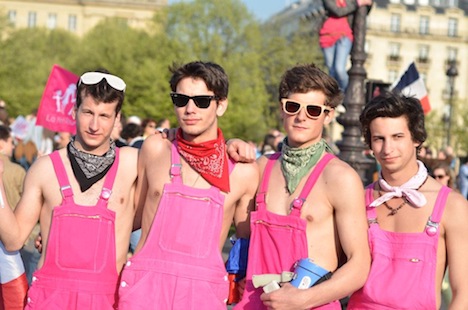To the rest of the world, France is a virtual billboard for sexual freedom and sophistication.![]()
Sex, of course, made an entire generation or two of French and European cinema — from Les enfants terribles to Jules et Jim to Last Tango in Paris. Paris, for nearly a century, has been the world’s premier city of romance, and its popular mayor since 2001, Bertrand Delanoë, is openly gay.
As recently as a few years ago, the amorous French were rated, alongside the Spanish, the Italians and the Brazilians, as the world’s best lovers. The international vocabulary of sex encompasses everything from French kissing to the ménage à trois. French voters have long accepted a certain liberté among their leaders — French president François Hollande and Ségolène Royal shared lives and children together for decades without formally marrying, former president Nicolas Sarkozy famously divorced and courted singer Carla Bruni in the first months of his presidency and former François Mitterand had a daughter with his mistress.
So it’s somewhat incongruent to see such strident opposition to same-sex marriage — on the day that France’s Assemblée nationale passed same-sex marriage into law, anti-marriage forces appear to have rioted in Paris, the city of love.
Since at least 1789, the French have never shied away from a riot — in recent years, France has seen civil unrest over everything from the plight of young Muslims in 2005 to the raising of the retirement age in 2010. But that hardly explains why same-sex marriage has become such a heated issue.
More troubling is that the vote follows at least two incidents of anti-gay violence perpetrated in France in recent days. Opponents vow to continue their fight — they’ve scheduled another large protest for May 26, notwithstanding the celebration of proponents of same-sex marriage, in France and beyond, and same-sex opponents have attacked Hollande’s government with increasing vitriol:
“They’re opening a Pandora’s box,” says Alain Escada, the head of the fundamentalist Christian group Civitas. “The next thing they will want three-way or four-way marriages,” blasted the archbishop of Lyon, Philippe Barbarin. “And then the ban on incest will be dropped.”
“Who would then, in the name of the sacrosanctness of love, still be able to convey that sex with animals or polyandry are wrongful,” asked the umbrella organization of Muslims in France. Finally, Frigide Barjot, the acid-tongued self-appointed icon of the anti-gay marriage movement, declared, “If Hollande wants blood, then he will get it.” The activist later retracted her statement.
Although the United Kingdom’s push for same-sex marriage hasn’t been without obstacles, it’s nonetheless moving forward and likely to be enacted by the end of the summer, largely without the passionate public opposition that we’ve seen in France.
Hollande has indicated he will sign the law, though the opposition has filed a challenge with France’s top constitutional court, so same-sex marriage, despite Tuesday’s vote, is not entirely a fait accompli.
There’s no mistaking the anti-marriage movement for the anti-marriage protesters in the United States, which is steeped in a more evangelical Protestant tradition. The name of most active anti-gay group ‘Manif pour tous‘ (‘Demonstration for all’) sounds at first like it could be a pro-gay group. It’s also a bit weird that the anti-marriage movement has adopted pink as its color, which makes the anti-gay protests in France look like, well, pretty much a gay pride parade in any other country:
So why, given the famously laid-back approach of the French to l’amour, are so many of the French so actively opposed to gay marriage?
The push for same-sex marriage remains a very partisan issue. Unlike in the United Kingdom, where a Conservative prime minister has made its enactment a priority, largely with the support of the even more socially liberal Labour and Liberal Democratic parties, same-sex marriage remains an entirely leftist project in France, pushed by Hollande and his allies in the Parti socialiste (PS, Socialist Party) who control the French national assembly.
Yesterday’s vote was largely split on partisan lines, with 331 in support and 225 opposed — the opposition largely coming from Sarkozy’s Union pour un mouvement populaire (UMP, Union for a Popular Movement). It’s odd to see the French right doubling down on opposition to gay marriage, even as conservatives in the United Kingdom and even in the United States are coming to embrace same-sex marriage. But it largely has to do with internal politics — Jean-François Copé, the UMP president, and other top center-right leaders remain terrified of losing support to the more socially conservative Marine Le Pen, the leader of the far-right Front national (FN, National Front). The same dynamic pulled Sarkozy increasingly to the right during his own presidential career on issues like immigration and crime.
France remains a highly Catholic nation — with over 70% to 80% of its population practicing Catholics — its more like Italy than the United Kingdom, where about half of the population is affiliated with the Church of England, which itself came into existence for political reasons, of course, not religious ones. But Portugal and Spain are even more universally Catholic than France, and both countries enacted same-sex marriage (Spain nearly a decade ago) without the kind of virulent anti-gay fanfare France is experiencing today. So religion alone doesn’t seem to explain it.
It’s also important to keep in mind that, even today, France is a fundamentally conservative nation. Far from the chic salons of Paris, it’s still a country where Sarkozy came within 1.5% of Hollande in the first round of the 2012 presidential election and where Le Pen won nearly 18% in the first round as well.
Finally, although polls show that a majority of French voters support same-sex marriage, it’s important to keep in mind just how unpopular Hollande has become in the past year since his overwhelming election in May 2012.
Barely a month into office, Hollande found himself undermined by his current partner, Valérie Trierweiler, who was seen to be boosting Royal’s opponent in a parliamentary race that Royal, Hollande’s former partner and the 2007 Socialist presidential candidate, ultimately lost. Hollande pushed through an unpopular top income tax rate of 75%, only to have the tax ruled unconstitutional by France’s top court. His budget minister Jérôme Cahuzac resigned from the national assembly earlier this month after he was discovered to have held a secret Swiss bank account. Despite a limited military action in Mali that’s widely seen as a success for his administration, Hollande has just a 34% approval rating according to a BVA poll earlier this month, and just 21% of a sample of French voters told IFOP earlier this month that they are satisfied with his administration.
Addendum, April 25: Some readers have suggested that the opposition is so stark because France has such a large rural (and presumably conservative) population. I thought the same thing when I first started writing this post, but that turns out just not to be true — France’s rural population (around 22%) is smaller than that in Spain (around 22.5%), which has gay marriage, or Germany (around 26%), which has nationwide civil unions and may well consider gay marriage in short order. The Netherlands has a rural population of around 17%, and it was the first country to recognize same-sex marriage back in 2001. But even still, the rural southwest of France is a large Socialist stronghold, which vigorously supported Hollande for president, whose campaign promise to enact same-sex marriage was very clear last spring.
I honestly don’t think there’s a single ‘magic bullet’ — you can’t point just to France’s Catholicism, you can’t point to conservative Muslim immigrants, you can’t point to rural conservatives, you can’t just point to the Le Pen / center-right divide or to Hollande’s dwindling popularity. I think it’s a confluence of a lot of factors, and that’s what makes it such an interesting phenomenon, even as same-sex marriage becomes relatively less controversial throughout much of the rest of Europe and the United States.


Good piece ‘ not least because you are not claiming knowledge of motivation as so many writers on the topic do.
I’ve been very surprised myself , but not any more. Media reporting in English is uniformly positive on SSM – even online. Opposition is consistently prefaced with adjectives like ‘fundamentalist’ , ‘conservative’ and of course ‘homophobic’. Even when opposers accept civil union. It puts me in mind of Bush’s post 9/11 demand for international support for the invasion of Iraq: ‘ If you’re not with us, you’re against us. ‘ So *any* opposition to the invasion equalled anti-Americanism. Not true of course, nor did he enjoy uniform support from Americans themselves.
So it is with French on the subject of SSM. The government imposed SSM through legislation: it did not go to referendum. Since France, like Ireland is a republic, not a monarchy like the UK, this angered many – including gays who believe civil union covers all bases in terms of protections, and who do not see any point in demanding access to an institution which has no relevance to unions that cannot have children.
As the implications of legalization began to penetrate – not least, the way human rights have come to mean whatever expensive lawyers decide, the issue of surrogacy came to tin fore. The case of a Canadian gay man using a state funded IVF programme to rent’a-womb’ by claiming he had a ‘ right’ to be a father really sounded the tocsins – since when did fatherhood – or motherhood become anyone’s right?
The French are pretty socialist in the best sense – they do not want to see a world in which AWGs – affluent white gays get to rent the wombs of poor brown women as a matter of course. Equality legislation was never intended to become a means to exploit the poor through womb prostitution. As many French gays are close to their mothers, surrogacy has become the real issue.
France, la republic, is symbolised by the banner- waving MarieAnne – mother of the nation. It is also the home of that other battle-axe female icon, Joan of Arc.
I don’t think the Anglocentric media will ever ‘get it’..or what ‘vive la differance!’ really means ..
Let’s be clear. Civil rights in any country shouldn’t be subject to majoritarian whim. That has nothing to do with republicanism or Joan of Arc. It has to do with the kind of liberalism that guarantees the rights and freedoms necessary for a healthy and robust democracy.